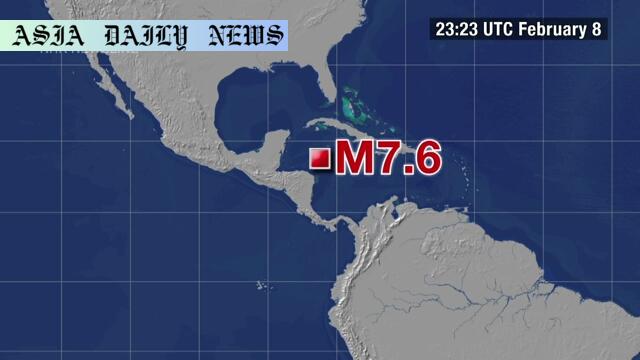Earthquake – A magnitude 7.6 earthquake occurred off the coast of Honduras, with earlier tsunami warnings now canceled.
- An M7.6 earthquake hit off the coast of Honduras on Saturday.
- The quake occurred at 23:23 UTC, north of Honduras.
- Tsunami warnings were issued but later lifted by PTWC.

Powerful Earthquake Hits Honduras, Tsunami Threat Dispelled
A magnitude 7.6 earthquake struck off the northern coast of Honduras on Saturday, prompting initial fears of a possible tsunami across the region. The earthquake, which hit at 23:23 UTC, was closely monitored by the US Geological Survey (USGS) and the Pacific Tsunami Warning Center (PTWC). Though the quake’s strength was notable, experts have since confirmed that there is no longer any tsunami threat to the surrounding areas, providing relief to concerned residents and authorities alike.
Initial Impact of the Earthquake
The earthquake, centered off the northern coast of Honduras, created widespread concern due to its high magnitude of 7.6. Strong seismic activity in this region often sends shockwaves across borders and islands, stirring fears of aftershocks or tsunamis. However, no significant damage or casualties have been reported yet, as authorities across the Caribbean mobilized emergency response teams and kept the public updated on developments.
Tsunami Warning and Cancellation
In the immediate aftermath of the quake, PTWC issued a warning about the possibility of a tsunami in the Caribbean Sea. Residents of nearby countries and islands were urged to stay alert and prepare for potential waves. However, further evaluations revealed that the tsunami risk had significantly decreased, allowing the PTWC to announce that the threat had passed. This announcement provided much-needed reassurance to communities in the affected zones.
Geological Context
The earthquake is a stark reminder of the geological activity in the Caribbean region, which is located near several tectonic plate boundaries. The movement of plates along these fault lines often results in earthquakes of varying intensities. The M7.6 quake off Honduras is one of the more powerful events recorded in recent years, underscoring the need for preparedness and efficient early warning systems.
Preparedness and Global Monitoring Efforts
Local authorities in Honduras and neighboring regions have been commended for their swift action and response. Emergency response measures are crucial in minimizing potential damage and keeping citizens safe. Global monitoring organizations like the US Geological Survey and PTWC also play vital roles in alerting and guiding affected areas during events of this magnitude.
Conclusion
The M7.6 earthquake off the coast of Honduras serves as a compelling reminder of the Earth’s dynamic nature. While the quake’s strength initially prompted concerns, the absence of a tsunami has provided relief to the affected communities. It is essential to continue investing in earthquake preparedness, monitoring systems, and global cooperation to manage such events effectively in the future. Authorities and residents alike can now begin the process of assessing the impacts and taking steps towards recovery.



Commentary
Commentary on Honduras Earthquake
A Reminder of Nature’s Power
The magnitude 7.6 earthquake that struck off the coast of Honduras serves as an undeniable reminder of nature’s unpredictable strength. Whenever seismic events of such intensity occur, they highlight how critical it is to have robust monitoring and preparedness systems in place. The timely response by monitoring agencies such as the Pacific Tsunami Warning Center showcases the importance of global cooperation and technological advancements in dealing with natural calamities.
Local Implications and Community Preparedness
For those living in Honduras and the surrounding regions, the earthquake likely stirred feelings of fear and uncertainty. While no tsunami materialized, the initial warning demonstrated the vulnerability of coastal communities. This event underscores the urgency for governments and agencies to invest in infrastructure that can withstand seismic activity, as well as comprehensive education campaigns for residents about safety protocols in such situations.
A Wake-Up Call for Global Preparedness
On a global scale, this earthquake acts as a wake-up call for areas prone to similar geological activity. Countries in seismic hotspots must prioritize the development of early warning systems and ensure that their citizens are equipped to respond swiftly in times of crisis. This event also sheds light on the pressing need to address gaps in response frameworks, funding for disaster preparedness, and urban planning in high-risk zones.
Looking Ahead
In the aftermath of an event like this, there remains a dual opportunity: to learn and to strengthen. Residents, governments, and scientists can collaborate to turn lessons from this earthquake into actionable solutions that minimize risks and bolster community resilience. As we reflect on the impact of this event, it is encouraging to see that disaster communication and rapid response efforts averted larger-scale devastation.